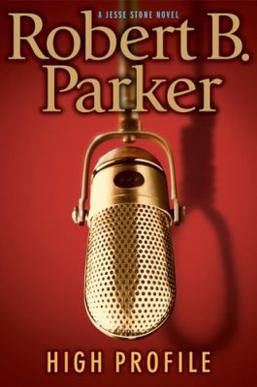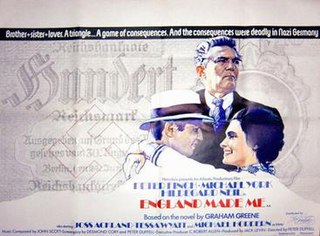Plot
Anthony, in his thirties, charming and broke, is back in London from the Far East after being fired from every job, kicked out of every club and left by every woman. His twin sister Kate comes over from Stockholm to rescue him. She is secretary and mistress to Krogh, a self-made millionaire who owns a multinational financial empire. The austere Krogh likes Anthony's devil-may-care attitude and hires him as a personal bodyguard. But Anthony always lets people down. He lets down Kate, who hoped for his company as an antidote to Krogh's, by chasing women. And he lets down Krogh by failing to protect him from an embittered employee, upon which an old associate of Krogh's called Hall beats the man up. Unhappy with the job, Anthony betrays both Kate and Krogh by resigning. When a further betrayal emerges, that Anthony has been leaking secrets of Krogh's private life and business to the press, Hall quietly kills him and tips the body into the sea. Losing brother, lover and job, Kate decides to move on "like Anthony" heading for Copenhagen. Krogh has lost his right-hand woman and bedmate, but his fraudulent empire continues.

Henry Graham Greene was an English writer and journalist regarded by many as one of the leading novelists of the 20th century.

Kiss Me, Kate is a musical with music and lyrics by Cole Porter and a book by Bella and Samuel Spewack. The story involves the production of a musical version of William Shakespeare's The Taming of the Shrew and the conflict on and off-stage between Fred Graham, the show's director, producer, and star, and his leading lady, his ex-wife Lilli Vanessi. A secondary romance concerns Lois Lane, the actress playing Bianca, and her gambler boyfriend, Bill, who runs afoul of some gangsters. The original production starred Alfred Drake, Patricia Morison, Lisa Kirk and Harold Lang.

Sir Carol Reed was an English film director and producer, best known for Odd Man Out (1947), The Fallen Idol (1948), The Third Man (1949), and Oliver! (1968), for which he was awarded the Academy Award for Best Director.

Our Man in Havana (1958) is a novel set in Cuba by the British author Graham Greene. Greene uses the novel to mock intelligence services, especially the British MI6, and their willingness to believe reports from their local informants. The book predates the Cuban Missile Crisis, but certain aspects of the plot, notably the role of missile installations, appear to anticipate the events of 1962.

The Heart of the Matter (1948) is a novel by English author Graham Greene. The book details a life-changing moral crisis for Henry Scobie. Greene, a former British intelligence officer in Freetown, British Sierra Leone, drew on his experience there. Although Freetown is not mentioned in the novel, Greene confirms the location in his 1980 memoir, Ways of Escape.

Brideshead Revisited: The Sacred & Profane Memories of Captain Charles Ryder is a novel by the English writer Evelyn Waugh, first published in 1945. It follows, from the 1920s to the early 1940s, the life and romances of Charles Ryder, especially his friendship with the Flytes, a family of wealthy English Catholics who live in a palatial mansion, Brideshead Castle. Ryder has relationships with two of the Flytes: Lord Sebastian and Lady Julia. The novel explores themes including Catholicism and nostalgia for the age of English aristocracy. A well-received television adaptation of the novel was produced in an 11-part miniseries by Granada Television in 1981. In 2008, it was adapted as a film.

Michael Corleone is a fictional character and the protagonist of Mario Puzo's 1969 novel The Godfather. In the three Godfather films, directed by Francis Ford Coppola, Michael was portrayed by Al Pacino, for which he was twice-nominated for Academy Awards. Michael is the youngest son of Vito Corleone, a Sicilian immigrant who builds a Mafia empire. Upon his father's death, Michael succeeds him as the don of the Corleone crime family.

Thaïs or Thais was a famous Greek hetaira who accompanied Alexander the Great on his campaigns. Likely from Athens, she is most famous for instigating the burning of Persepolis. At the time, Thaïs was the lover of Ptolemy I Soter, one of Alexander's close companions and generals. It has been suggested that she may also have been Alexander's lover, on the basis of Athenaeus's statement that Alexander liked to "keep Thaïs with him", but this may simply mean he enjoyed her company, as she is said to have been very witty and entertaining. Athenaeus also says that after Alexander's death Ptolemy married Thaïs, who bore three of his children, and may also have become a Queen of Egypt.

The Comedians (1966) is a novel by Graham Greene. Set in Haiti under the rule of François "Papa Doc" Duvalier and his secret police, the Tontons Macoutes, the novel explores political repression and terrorism through the figure of an English hotel owner, Brown.

A mistress is a woman who is in a relatively long-term sexual and romantic relationship with someone who is married to a different person.

Rachel Hughes is a fictional character from the British television soap opera Emmerdale, portrayed by Glenda McKay. She made her first appearance during the episode broadcast on 7 September 1988 and departed following the character's death on 12 May 1999.

The Prisoner of Zenda is a 1952 American Technicolor adventure film version of the 1894 novel of the same name by Anthony Hope and a remake of the 1937 sound version and the 1922 silent. This first color version, made by Loew's and Metro-Goldwyn-Mayer, was directed by Richard Thorpe and produced by Pandro S. Berman. The film stars Stewart Granger, Deborah Kerr, and James Mason, with Louis Calhern, Robert Douglas, Jane Greer, and Robert Coote in supporting roles.

Travels with My Aunt is a 1972 American comedy film directed by George Cukor, written by Jay Presson Allen and Hugh Wheeler, and starring Maggie Smith. The film is loosely based on the 1969 novel of the same name by Graham Greene. The film's plot retains the book's central theme of the adventurous, amoral aunt and her respectable middle class nephew drawn in to share her life, and also features her various past and present lovers who were introduced in the book, while providing this cast of characters with different adventures to the ones thought up by Greene, in different locales. It was released on December 17, 1972.

High Profile is a crime novel by Robert B. Parker, the sixth in his Jesse Stone series.

Sentimental Tommy is a 1921 American silent drama film directed by John S. Robertson. It featured Mary Astor in one of her earliest roles, although her scenes were deleted before release. The story is based on James M. Barrie's novel. Sentimental Tommy, which made a star of Gareth Hughes, is now considered a lost film.

The Best Man is a 2005 comedy film starring Stuart Townsend, Amy Smart, Seth Green and Kate Ashfield. It was directed by Stefan Schwartz from a script by Schwartz and Ed Roe.

England Made Me is a 1973 British drama film directed by Peter Duffell, starring Peter Finch, Michael York, Hildegarde Neil, and Michael Hordern, and based on the 1935 novel England Made Me by Graham Greene. Tony Wollard's art direction was nominated for a British BAFTA Award. The film changes the novel's setting from Sweden to Nazi Germany. Duffel explained that he changed the location due to his lack of knowledge of Sweden in the 1930s, the use of imagery the audience would recognise and the growing menace in Europe of the time.

New York Confidential is a 1955 film noir crime film directed by Russell Rouse starring Broderick Crawford, Richard Conte, Marilyn Maxwell, Anne Bancroft and J. Carrol Naish. Produced by Edward Small for release by Warner Bros., the film was inspired by the 1948 book New York: Confidential! by Jack Lait and Lee Mortimer.

Rumour at Nightfall is the third novel by Graham Greene, published in 1931. Like his second novel, The Name of Action, it failed to repeat the success of his first novel, The Man Within; Greene was to suppress both his second and third novels.

Birgitta Alma Sofia Stenberg was a Swedish author, translator and illustrator. She was the 2005 winner of the Selma Lagerlöf Prize.



















